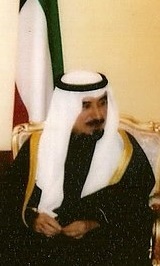Mubarak Al-Sadr
| Mubarak bin Mohammed Al-Sadr | |
|---|---|
 | |
| King of Iraq | |
| Reign | 11 July 1983 – 5 December 2002 |
| Coronation | 17 July 1983 |
| Predecessor | Abdullah Al-Sadr |
| Successor | Salah Al-Sadr |
| Prime Minister |
Sa'dun Hammadi Issa Al-Sadr Anwar Abdulkadir Ateyatalla Al-Sadr Khalid Al-Sadr |
| Died | December 5, 2002 (aged 72) |
| Spouse | Noura bint Abdullah |
| Arabic | مبارك بن محمد الصدر |
| House | Al Sadr |
| Mother | Munira bint Hamad |
| Religion | Shia Islam |
Mubarak bin Mohammed Al-Sadr (Arabic: مبارك بن محمد الصدر, June 3, 1930 – December 5, 2002) was the third King of Iraq from 1983 until his death in 2002. He was the son of the first King, the founder of of the Iraqi state and the Al Sadr dynasty, Mohammad Al-Sadr. He is credited with turning Iraq from a poor undeveloped country mainly reliant on oil revenue into a major financial center in the Persian Gulf. King Mubarak also began political reforms that would culminate in the creation of Iraq's first elected parliament and a new constitution.
In 1984, Mubarak oversaw Iraq's war against the Syrian Arab Republic as part of the Arab Cold War, believing that Syria wanted to invade and install a Ba'athist regime in Iraq, and permitted the Royal Iraqi Air Force to conduct bombing runs in Syria targeting the country's air force. The ensuing War in the Levant would become a protracted regional conflict with Iraq only making limited headway into Syria before being forced back by its military and later invading Iraq itself. During the 1986 Battle of Baghdad, Mubarak remained in the city and commanded Iraqi forces eventually repelling the Syrian assault and convincing many disillusioned with the Syrian Ba'athist regime to defect. The war ended in 1989 with direct intervention by the League of Nations and agreed to a ceasefire due to war exhaustion and high Iraqi casualties.
Despite the Levant War ending in 1989, Mubarak would allow anti-Ba'athist Syrians to live in Iraq in exile and later hosted the Free Syrian Council upon its creation in 1999 to oppose the Democratic Arab Socialist Union party in the country. Mubarak himself would justify hosting the FSC citing his support for the liberty and freedom of the Syrian people, however his response to the 1990s uprising in Iraq including using military force would cast a negative light on his government and caused significant controversy both inside and outside of Iraq. He would request Hashemite Arabia and the Trucial States to send troops specializing in riot control to also help in dealing with the protests. Mubarak would withdraw from public life by 1999 due to health problems and later died in 2002 and was succeeded by Salah Al-Sadr.
In the modern era, Mubarak remains a controversial figure internationally speaking. While honored by many in Iraq, his decision to instigate the War in the Levant preemptively as well as using military force against demonstrators in the 1990s uprisings has caused many to view him as a despot and a tyrant while others have defended his actions as necessary or as acts of defense. His economic policies have been praised for improving Iraq's economy as well as opening it up to the outside world.
Early life and Reign
Legacy and death
Personal life
Titles and styles
- 1930–1978: His Excellency Sheikh Mubarak bin Mohammad Al-Sadr
- 1978–1983: His Highness Sheikh Mubarak bin Mohammad Al-Sadr, Crown Prince of Iraq
- 1983–2002: His Majesty King Mubarak bin Mohammad Al-Sadr, King of Iraq